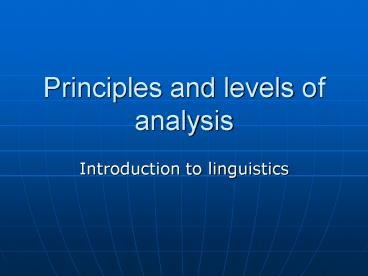Principles and levels of analysis - PowerPoint PPT Presentation
1 / 20
Title:
Principles and levels of analysis
Description:
when s/he can use a general category to refer to a specific piece of reality ... The accusative form of a neuter word is identical with its nominative ... – PowerPoint PPT presentation
Number of Views:109
Avg rating:3.0/5.0
Title: Principles and levels of analysis
1
Principles and levels of analysis
- Introduction to linguistics
2
linguistic knowledge
- linguistic knowledge involves
- an abstraction from actuality
- some kind of classification of experience.
- One can use a language
- when s/he can use a general category to refer to
a specific piece of reality - acquisition of pronouns
- when s/he can put his/her individual experience
in general linguistic categories - emotions
3
linguistic description
- deals in generalities
- linguistic explanation depends on some
dissociation from the immediacy of experience - it deals with abstract categorization of certain
groups (classes) of elements
4
how many words?
- loves me
- loves me not
- loves me
- loves me not
- loves me
- loves me not
- loves me
5
type and token
- word
- an ambiguous notion
- more precise terminology needed
- type and token
- abstraction and reality
- category and element in a category
6
tokens
- love
- Love
- love?
- Love?
- Love!
- Love?!
7
type
- love
- a category with several elements
- love Love love? Love? Love! Love?!
- love is the name of this category
- and also its element
8
tokens and types
- a token
- a particular and actual instance of a general and
abstract type - in linguistics there are various categories
(classes) - noun
- vowel
- morpheme
- what are the principles of classification?
9
- TYP lac. lt gr., metodol. we wspólcz.
metodologii nauk empirycznych obiekt lub
konstrukcja pojeciowa (pojecie typologiczne)
o charakterze wzorca, sluzace systematyzacji
i opisowi naukowemu danej dziedziny
rzeczywistosci - typ (przedmiot wzorcowy) lub pojecie typolog.
jest wyznacznikiem tych wlasciwosci, ze wzgledu
na które rozpatruje sie poszczególne przedmioty
i, porównujac je ze wzorem, charakteryzuje sie
przez stwierdzenie stopnia ich podobienstwa do
niego - wzorzec nazywa sie typem empirycznym jesli
zostal wyrózniony sposród empirycznie danych
elementów okreslonego zbioru,
10
Principles of linguistic analysis
- A linguistic principle is a generalized statement
about the behaviour of forms in a language.
11
Observation
- Linguistic principles of a language are
- patterns of language behaviour which are noted by
observation. - That is, they are deduced from what is observed
to happen in the language.
12
Forms in context
- These forms are brought together into classes,
that have either - a similar structure, or/and
- occur in similar contexts.
13
Example
- boy-boys, dog-dogs, girl-girls, etc.
- make-makes, love-loves, hate-hates
- a boy makes/boys make
- a girl makes/girls make
- boy girls
- make dogs
- make loves hate
14
Linguistic rules
- A rule exists in a given language, and is the
application of a linguistic principle in a
particular situation in that language.
15
Regular/Irregular
- All languages contain both rules which are
- invariable
- of universal applicability in that language
- The accusative form of a neuter word is identical
with its nominative - and rules which have exceptions to them
- i.e., irregular word forms.
16
Regular/irregular
- A word form is regular if that word form is
predictable on the basis of such rules - a word form is irregular if that word form is not
predictable on the basis of such rules. - boy-boys, love-loved
- child-??, make-??
17
Type/token
- Tokens are physical entities
- Types are
- idealizations
- we do not pay attention to minor changes,
distortions. - abstractions
- bringing together forms that we OBSERVE in
reality - and perceive as THE SAME
18
Scale of abstractions
- Types are one basic scale in the ladder of
abstractions - boy-boys
- girl-girls
- These are forms that we perceive as the same
- except that they regularly appear in similar
contexts - boys/girls are/were
- after particular words
19
Word-forms
- Those types (of words) that differ in
- one feature only,
- dependent on the position in a clearly defined
context - contextual variants
- here called inflectional variants
- word forms.
- boys
- plural of BOY
- boy
- singular of BOY
20
Classes of word-forms
- Boy, boys
- we need a class of these forms
- including both
- boy, boys
- but also
- boys, boys
- This is called the lexeme
- lexeme
- BOY boy, boys, boys, boys
- name of the lexeme?









![[PDF] Principles of Epidemiology for Advanced Nursing Practice: A Population Health Perspective: A Population Health Perspective 1st Edition Full PowerPoint PPT Presentation](https://s3.amazonaws.com/images.powershow.com/10087818.th0.jpg?_=20240729071)





















